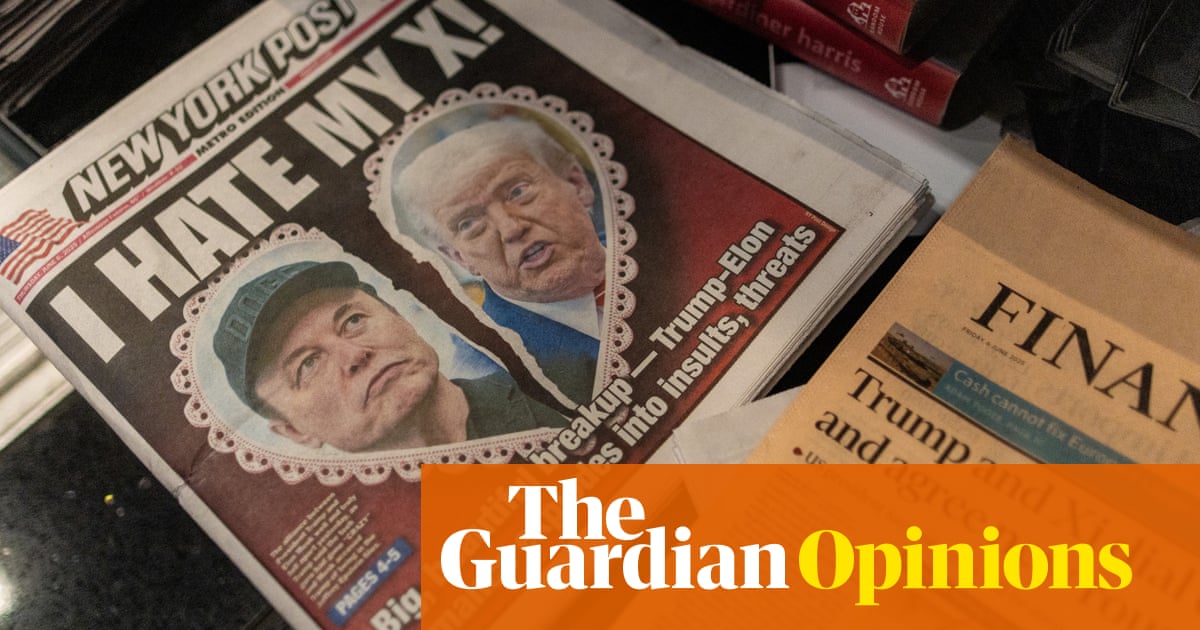It would have taken a heart of stone to watch thedeath of the Trump-Musk bromancewithout laughing. Democrats passed the popcorn on Thursday night as the alliance between the world’s most powerful man and the world’s richest imploded via posts on their respective social media platforms.
Less than a week ago they attempted a conscious uncouplingin the Oval Office. Then Elon Musk’s attacks on Donald Trump’s “big, beautiful” tax and spending plan escalated tofull-scale denunciationof a “disgusting abomination” – objecting to its effect on the deficit, not the fact it snatches essential support from the poor and hands $1.1tn in tax cuts to the rich.
The president said that Mr Musk had “gone crazy” and was angry that electric vehicle subsidies were being removed, claimed he had fired him, threatened to terminate his government contracts, and mocked the billionaire’s recent black eye.Steve Bannonchipped in, suggesting that Mr Musk should be deported.
Mr Musk said Mr Trump should be impeached and alleged the government had not released files on the late paedophile financier Jeffrey Epstein because the president was in them. He threatened to immediatelystart decommissioning the Dragon spacecraft– now key to Nasa’s programme – and suggested it was time for a new political party. The ultimate insult: “Without me, Trump would have lost the election,” he wrote.
Mr Musk laterappeared minded to limit the damage, backing away from the spacecraft threat – not surprising, perhaps, when he had just watched $152bnwiped off Tesla’s value. Each man knows thatthe other could hurt him, via government fiat or political war chest. Yet both are so unpredictable that the row could still reignite.
Two narcissists used to imposing their will were never likely to coexist happily for long, despite the advantages of doing so: this was less a marriage of convenience than of naked self-interest. Mr Trump loathes sharing the limelight; the Tesla boss frequently grabbed it. The president is surely as resentful of as he is dazzled by Mr Musk’s spectacular wealth. He was angered to discover that Mr Muskhad arranged private briefingson the Pentagon’s plans for any potential war with China – not only a blatant conflict of interest, but perhaps more upsettingly, a sign of his growing power. Mr Musk’s behaviour has also appeared increasingly erratic. A recent New York Times report alleged he took large amounts ofdrugs including ketaminewhile advising Mr Trump prior to the election. Mr Musk hasdescribedthe story as “bs”.
His departure from the president’s orbit is good news. Mr Musk implausibly claimed he would save $2tn annually – approaching a third of the federal budget – by taking a chainsaw to bureaucracy. Wild decisions by the so-calleddepartment of government efficiencyare mired in the courts. But he has nonetheless caused real damage which will not easily be remedied, gutting agencies and departments which took decades to build. People aredyingbecause of his demolition of USAID.
Yet while the bond between the peak of power and the peak of wealth has been severed, politics remains in thrall to money. Mr Trump’s approach is particularly noxious, turning wealth directly into political favours and power, and power into further wealth. This is the new oligopoly. He oversees a cabinet of billionaires, and has directed his real estate tycoon friend Steve Witkoff, a man with no diplomatic experience, to bring peace in the Middle East and Ukraine. But though megadonors areheavily skewedtowards the Republicans, Democrats toodepend onbillionaires. Mr Musk is a symptom of the underlying malaise. Democracy requires better safeguards against the unhealthy marriage of wealth and power than the rampant egos of those who command them.
